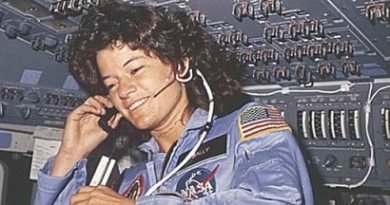Clear Skies, Brave Travelers – The End of the Space Shuttle Era

Today the Space Shuttle Atlantis rocketed from the planet Earth for her final trip into outer space, and with that historic launch comes the end of an era. There are no future manned spaceflights planned for NASA. In fact, if something goes wrong on this last mission, we will have to ask the Russians to assist in the rescue operation. If you had told me twenty-five years ago, when I accepted my internship to work for the Air Force’s Space Command Office in the Pentagon, that this country would have to rely on the Russians to rescue our astronauts I would have told you that was inconceivable. Yet that’s right where we are…
Generally I keep my political views between myself and the voting machine, but there are times, like now, when it seems like everyone has lost sight of the endgame. Today I felt it necessary to say something – and remarkably, yes, I can relate it back to science fiction and fantastical storytelling, so I don’t feel like I’m outside my vision for the blog.
Pretty much everyone can agree that governments are created to promote the greater good. The trouble, of course, often lies in trying to reach consensus about defining exactly what creates a greater good. For generations people have battled over the form and type of governing body, but in the end even the best political system is only as good as the people who run it. The question to ask yourself, then – whether you’re Democrat, Republican, Independent, or something else entirely – is whether you believe the people running the show are good people working for the greater good?
This is what I believe: the system in America, while the best political system in theory, is hopelessly tripped up by leadership – on both “sides” of our current two-party structure – invested in their own short-term goals. The end of the Space Shuttle program encapsulates the short-term endgames that are turning us from the greatest country in the world to just a country in the world.
In principle the greater good includes things we can’t provide on our own as individuals – firefighters, police, national defense, cures for disease. In the United States, people volunteer to fight for their country, brave dangerous fires, and pursue criminals, and we as a collective body contribute to their incomes based on the basic understanding that we will all need to call upon these brave men and women some day ourselves. This is an insurance policy on our futures.
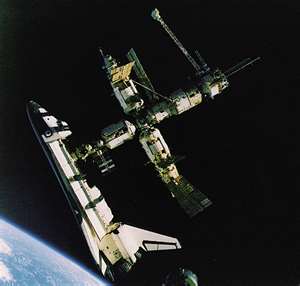 The race into space was a matter of national pride, but it was also an investment in the greater good of America, and in fact all peoples. The advances made in medicine, in science, and in technology are unquantifiable in their contribution to our greater good, and would have been financially unsound for private parties to risk. As corporations take to space now, I’m not sure we as a nation comprehend the financial risk of relying on corporations to be the vanguard of space travel. What happens should the plot of Armageddon or Deep Impact come true? Will we become fiscally kidnapped by a corporation, or another country, that will posses the only technology to save mankind? Should we risk beholding to anyone else? Isn’t it inherent upon great nations to ensure their own survival?
The race into space was a matter of national pride, but it was also an investment in the greater good of America, and in fact all peoples. The advances made in medicine, in science, and in technology are unquantifiable in their contribution to our greater good, and would have been financially unsound for private parties to risk. As corporations take to space now, I’m not sure we as a nation comprehend the financial risk of relying on corporations to be the vanguard of space travel. What happens should the plot of Armageddon or Deep Impact come true? Will we become fiscally kidnapped by a corporation, or another country, that will posses the only technology to save mankind? Should we risk beholding to anyone else? Isn’t it inherent upon great nations to ensure their own survival?
The true irony is that our President, some of whose policies involve creating bigger government reaching farther and deeper into new facets of our lives, wants to privatize missions to space. And just so no one thinks I’m being one-sided, the close of the Shuttle era was decided during the Bush Administration, which was criticized for propping up one-sided private contracts for large corporations. Combine that with the general feeling that not many holding political office are truly looking out for everyone else’s long-term good, and it begs the question, is this really a choice made in America’s best interest?
Adventuring into the unknown, that has been part of the greater good for millennium – from the early sailors who crossed the seas in search of a new land to the families who pushed into the Wild West. Eventually, but not always immediately, these men and women who sought out brave new worlds created a better life, maybe not for themselves but for their descendents, and their struggles resulted in a positive achievements for mankind in the aggregate.
Back in the day, my Pentagon internship started shortly after the Challenger had exploded. Things were hectic. The space shuttle program should have been on automatic pilot and new space initiatives in the works, but instead my first summer was spent working on presentations to Congress to propose appropriate retasking of the shuttle program on the Air Force’s side. (No, the shuttle is not just NASA’s baby; it’s always been a joint operation with the military.)
About the same time, as a freshmen at Duke University, we were all charged with reading Duke Engineering Professor Henry Petroski’s To Engineer is Human: The Role of Failure in Successful Design. It sounds like dry, boring engineering stuff – but when the freshmen class, where liberal arts majors are the majority by far, gathered in the Duke Chapel to discuss the book, the relevance to the shuttle disaster wasn’t missed. The discussion was quite enthusiastic, and I remember walking away that day thinking that my freshmen class took the Challenger disaster as a stumble on the way to the greater good that would be derived by America’s advances in manned space travel.
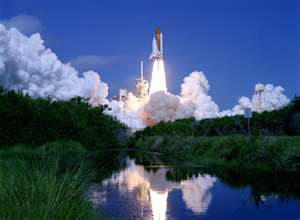
Truly, you have to get a sense of how far we’ve come to understand what America has achieved in the past twenty-five years. In engineering school, in order to run complicated analysis we had to wait our turn for time on the mainframe and put punch cards into a reader. Today, these same computations can be run on a personal computer, whenever an engineering student would like, minus the punch cards. At the Pentagon, my word processor – and for you young ones, no, this was not a personal computer, but really a glorified typewriter that simply processed words that you had to manually scroll – used floppy discs the size of a vinyl record. Presentations were done on slides that had to be printed and mounted manually in a cardboard frame; each slide was manually placed on the projector as the briefings moved along. None of this carrying the thumbdrive to your presentation and plugging into someone else’s laptop to click through a PowerPoint file. Spellcheck did not exist, except in our own minds; we looked everything up. No copy and paste – it was called retype entirely.
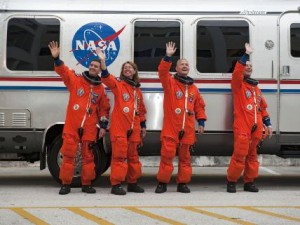 I mean how the heck did we even get into outer space? No PCs, no cellphones, no iPads… There’s more computing power in one smartphone than the lunar lander. Yet, they got us into space. Over and over again. One of the perks of my job was that I got to work with some of these brave voyagers in real life, to witness how their minds work, to absorb what makes them tick. I also had the pleasure of working day in and day out beside some of country’s finest warriors, many of them fighter pilots. (The bravado in Top Gun isn’t the stuff of fiction.) It was an exciting and inspiring time. It made me want to pursue engineering even more; it caused me to dream about all the infinite possibilities for my future and the future of this great country.
I mean how the heck did we even get into outer space? No PCs, no cellphones, no iPads… There’s more computing power in one smartphone than the lunar lander. Yet, they got us into space. Over and over again. One of the perks of my job was that I got to work with some of these brave voyagers in real life, to witness how their minds work, to absorb what makes them tick. I also had the pleasure of working day in and day out beside some of country’s finest warriors, many of them fighter pilots. (The bravado in Top Gun isn’t the stuff of fiction.) It was an exciting and inspiring time. It made me want to pursue engineering even more; it caused me to dream about all the infinite possibilities for my future and the future of this great country.
I can’t tell the story about my time working as an intern, though, without relaying another experience. Admittedly I had somewhat of a sheltered life, in a good home, traveling around the country as an Army brat. Part of stepping out into the real world, even as an intern, is experiencing people from all walks of life. There was an administrative assistant who taught me everything I needed to know that first year in the Pentagon about the comings and goings inside an office that was literally a vault. (That’s right; passage in and out required getting the door unlocked.) Considering she was pregnant at the time, I wasn’t surprised to learn she wouldn’t be back the following year. Women (and some men) have babies and choose to stay at home. But what struck me was how she had come to this point in her life. This woman was giving birth to her third child, and that, she informed me, was the tipping point of children to earn enough money from the government to stay at home with her kids…
Wow, I thought as I pondered my earliest paychecks and the pittance of taxes that were being withheld, who was paying for that? Did she think money grew on trees? And how could encouraging a mother to have another child by giving her more money be for the greater good? Sadly, this was the first time I’d come across this mindset, and I know it won’t be the last. Just the other day, I watched an overweight man buy cigarettes and alcohol with his food stamp debit card, then sat down to watch four men interviewed about losing their jobs after the shuttle programs ends with today’s launch. How did we get here?
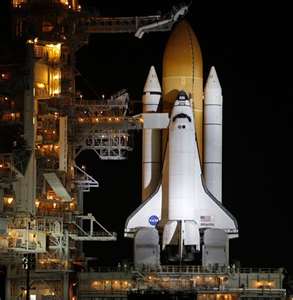 There is the greater good and there is each person’s good. The greater good is dependent on all men and women to contribute as best they can in service, deeds, or taxes. Personal good or advancement should never be the role of government other than to educate us, prop us up when we’re down, and give us the tools to seek out whatever ultimate greatness we desire.
There is the greater good and there is each person’s good. The greater good is dependent on all men and women to contribute as best they can in service, deeds, or taxes. Personal good or advancement should never be the role of government other than to educate us, prop us up when we’re down, and give us the tools to seek out whatever ultimate greatness we desire.
I’m a human being raised in a charitable household, and I’ve been the first to prop someone up when they’re down. Some argue that government-sponsored welfare is vital and necessary to this country, and every other country for that matter; they’ll ask, how could you talk about sending astronauts into space when there are people to be fed here on Earth? My answer is this – just because we can do something, doesn’t mean we should, and just because it appears we can’t do something, doesn’t mean we shouldn’t pursue it. The balance lies in understanding the short term costs against the long term gains, and remarkably I learned about that not in a philosophy class meant to round out my education but in engineering school. As an engineer, every day we are faced with presenting the upfront costs against the unquantifiable and intangible benefits realized from advances in engineering.
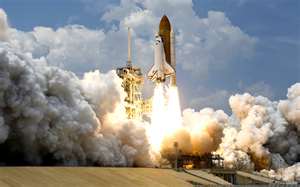 Take for instance the government’s role in a few technological feats. Stringing electric lines across open countryside seemed like a poor investment to the private sector, so public utilities were formed and power poles began popping up across the nation. Would America have been the epicenter of movie-making and television had we waited for electric lines to be profitable? Build it, and it will come. Railroads, highways, superhighways, the Panama Canal. Every advance in this country rolls down from projects no one individual could achieve, and that many imagined a worthless endeavor.
Take for instance the government’s role in a few technological feats. Stringing electric lines across open countryside seemed like a poor investment to the private sector, so public utilities were formed and power poles began popping up across the nation. Would America have been the epicenter of movie-making and television had we waited for electric lines to be profitable? Build it, and it will come. Railroads, highways, superhighways, the Panama Canal. Every advance in this country rolls down from projects no one individual could achieve, and that many imagined a worthless endeavor.
Or take, for instance, the people of New Orleans and the tragic flooding after Hurricane Katrina. On some level living below an imaginary line called sea level makes it difficult to grasp the true risk. They couldn’t see it or touch it, but it doesn’t mean they lived at an elevation where the sea and gravity are on the favorable side for a win. The danger always existed. Yet prior to the hurricane, there was resistance to taxation to reinforce the levee system. When the levees failed, the Corps of Engineers were held up for all to blame, but you simply can’t improve levees with money growing on trees. These are the intangible benefits, the ones just beyond most people’s perception of reality, that we pay the most dearly for in the end when the government fails to do its job of stepping up to ensure the greater good is achieved.
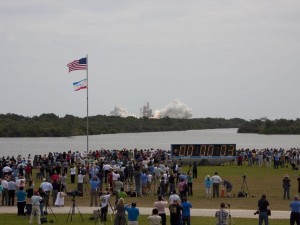
For the shuttle program, though, I think it’s the loss of the intangibles that promote positive change that will cost our country the most. One man, or later several men and women, strapped on the top of a rocket can inspire the dreams of a nation. This unknown gain, the one we’ll only realize twenty or maybe fifty years from now, is so vital to the individuals of this nation. We have to be a viable, profitable country to ensure that we can still feed the hungry of our future.
NASA assures us that we will still be exploring the vastness of space, just in different ways. None of them can or will serve the greater good like the Space Shuttle has. Why? Because their gains are too inscrutable. Nothing is more powerful than a healthy dose of inspiration. Today children watched four astronauts hurled into space, but when they talk of some day too becoming an American astronaut someone will have to put a reality check on that dream. Honestly, I never thought I’d see the day.
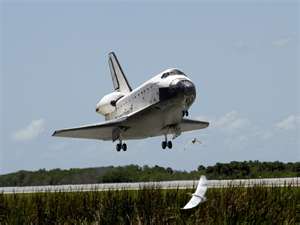 The Space Shuttle was science fiction made real. In thirteen days, when Atlantis makes her finally landing at Cape Canaveral, American manned space flight will become science fiction once more. It’s up to the storytellers, then, to inspire the next generation to greatness, to create dreams of living on a space station or working on the moon. Luckily American imaginations and our national ability to produce some of the world’s finest storytelling are unrivaled. Next time we watch a man land on Mars it will have to be movie magic. Scifi writers better get hopping.
The Space Shuttle was science fiction made real. In thirteen days, when Atlantis makes her finally landing at Cape Canaveral, American manned space flight will become science fiction once more. It’s up to the storytellers, then, to inspire the next generation to greatness, to create dreams of living on a space station or working on the moon. Luckily American imaginations and our national ability to produce some of the world’s finest storytelling are unrivaled. Next time we watch a man land on Mars it will have to be movie magic. Scifi writers better get hopping.
To every man and woman who helped launch America’s ships of dreams into space, thank you for the inspiration. The people of the world are in your debt for the deeds and lives you have served. Not everyone hoped their contribution to the adventures of mankind would be as an astronaut. For some of us, aspiring to be the person who designed the runway that brought those astronauts home safely, while not as glamorous, was just as good. Touching just one part of the Space Shuttle’s journey has brought me great pride, and in some part a little adventure each time they blasted off into space.
- Hyperspace Theories: SKELETON CREW Ahoy! - December 29, 2024
- Hyperspace Theories: WICKED Part I Rises to the Moment - December 6, 2024
- Columbia’s Vader™ Collection Launches Dec 5 - November 27, 2024








